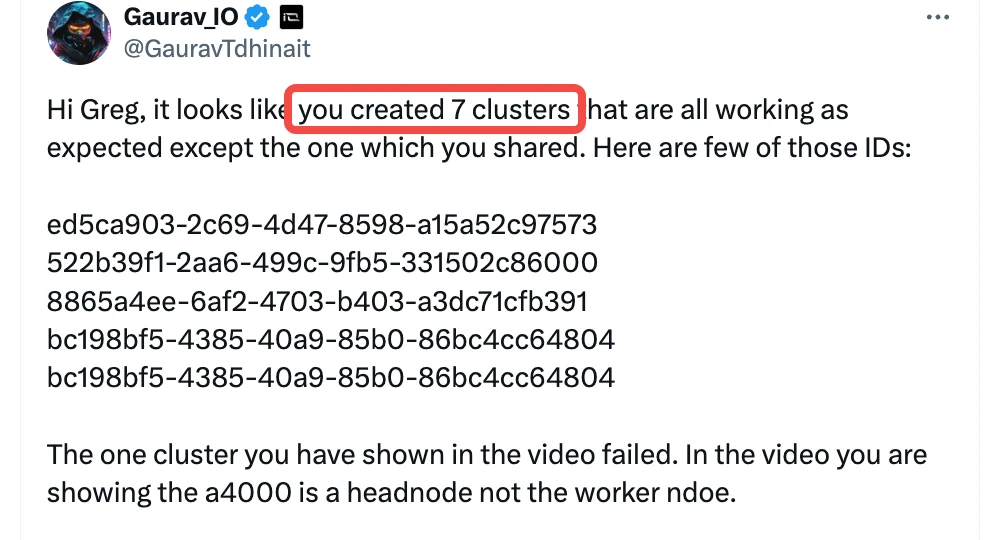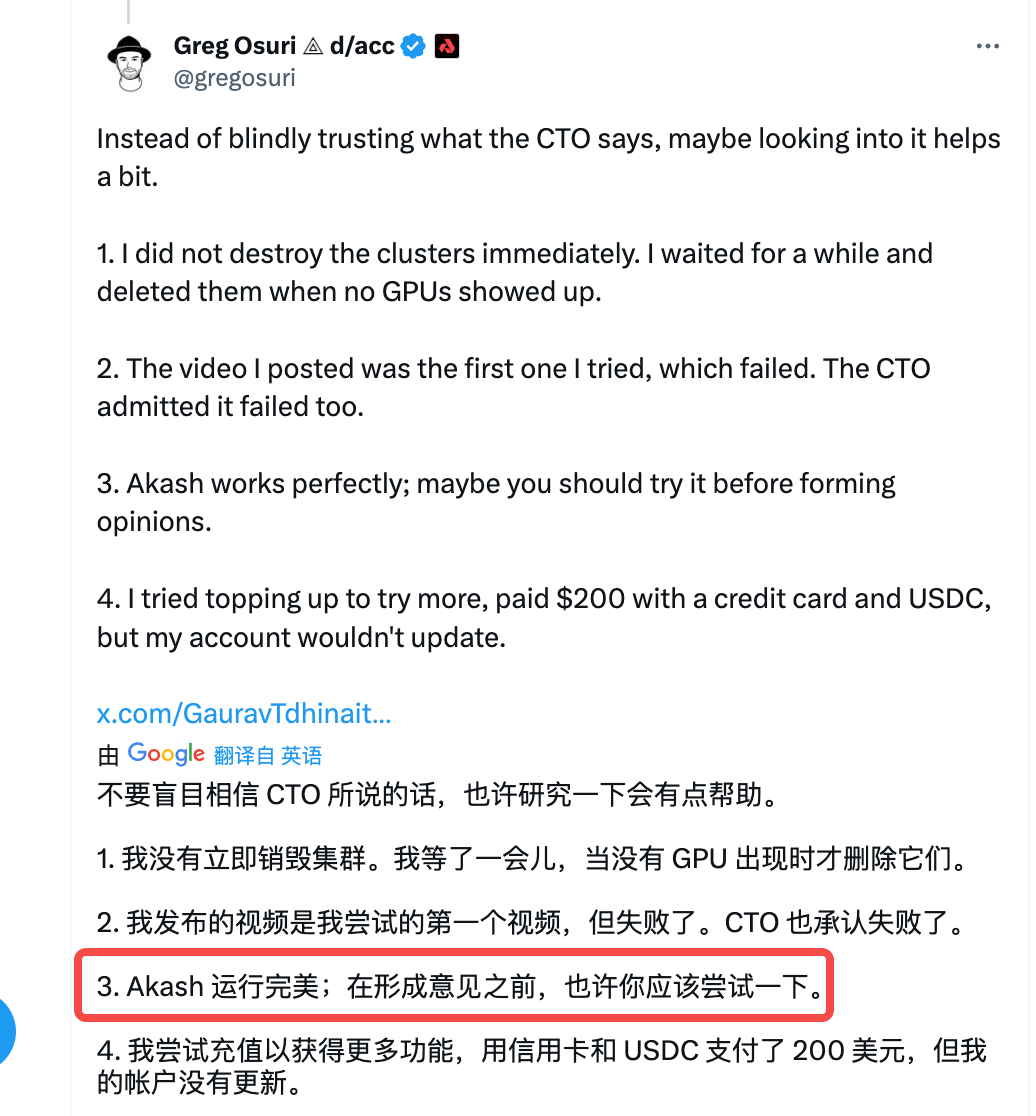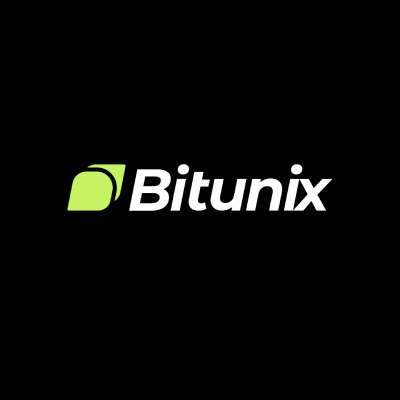Orijinal yazar: TechFlow
Son günlerin en dikkat çeken olaylarından biri de IO.NET token'larının piyasaya sürülmesi oldu.
Binance açılışındaki fiyat değişimlerinden, IO token madenciliği için grafik kartları sağlama deneyiminin incelenmesine kadar... tüm dikkatin IO'nun varlık seviyesine odaklandığı görülüyor.
Ancak bu görüşe katılmayanlar da var.
Örneğin, başka bir merkezi olmayan bulut bilişim projesi olan Akash Network'ün kurucusu Greg Osuri biraz huzursuzdu. Dikkatini IO fiyatlarındaki değişikliklere odaklamışken, IO.NET ürününü deneyimlemeye gitti.
Sonuç olarak deneyim pek tatmin edici olmadı.
Greg daha sonra Twitter'da IO.NET'in çeşitli ürün deneyimi sorunlarına dikkat çekmeye başladı ve başka bir şirketin kurucusundan IO.NET'in kalite denetçisine dönüştü.
IO.NETs CTO Gaurav Tdhinait Greg'in sorularının her birini sabırla açıklayarak sırayla cevapladılar.
İki taraf ileri geri bir tartışma yaşadı. Yüzeyde, ürün deneyimi üzerine nesnel bir soru-cevap oturumuydu, ancak perde arkasında iki benzer iş projesi arasında bir rekabet ve marka imajının korunması vardı.
Akash'ın kurucusu rakip şirketlerin ürünlerini denedi ve önerilerde bulundu. Bu noktada, bunun sadece eğlence amaçlı mı yoksa kasıtlı olarak kusur bulma amaçlı mı olduğunu söylemek zor.
Akash kurucusu Greg ile IO.NET CTO'su arasındaki tüm konuşmayı derledik Gaurav Tdhinait olayı geri yüklemek için.
Apple ürünü satın alıp Nokia aldığınızda kendinizi aldatılmış mı hissediyorsunuz?
Olayın nedeni, Akash'ın kurucusu Greg'in IO.NET kullanırken aldığı ilk başarısızlık geri bildiriminden kaynaklandı.
Greg, IO.NET üzerinden 4 adet A100 GPU ekran kartından oluşan bir küme satın aldı ve ilgili ücretleri ödedi.
Kümeyi dağıttıktan ve ücretleri ödedikten sonra Greg, malların sipariş ettiği gibi olmadığını keşfetti. Çeşitli verileri kontrol ettikten sonra, 4 A100 GPU almadığını, yalnızca bir RTX a4000 aldığını buldu.

Kağıt üzerinde, istediği ile gerçekte elde ettiği arasında büyük bir performans farkı vardı. Greg, bunun bir Apple telefonu için ödeme yapmak ama sadece eski bir Nokia telefon almak gibi olduğunu söyledi.
Greg, gerçekliğini kanıtlamak için Twitter'da @IO.NET'ten açıklama istemekle kalmadı, aynı zamanda satın alma ve operasyon adımlarının tamamını içeren kaydettiği bir video kaydını da yayınladı.
Bu paylaşım kısa sürede viral oldu ve hatta bazıları bunun bir sahtekarlık olduğuna inanarak IO.NET'ten açıklama talep etmeye başladı.
Bu hareket, IO.NET'in CTO'su Gaurav'dan ( @GauravTdhinait ), nispeten makul bir açıklama yaptı.
Greg'in video kaydındaki sözde hatalı mal, aslında oluşturduğu kümedeki sunuculardan (node'lardan) birinin sağlıksız olması, dolayısıyla kümenin normal şekilde çalışamamasından kaynaklanıyor.
A 100'ün RTX 4000'i almasının sebebine gelince, Greg'in gösterdiği RTX 4000 aslında kümenin ana düğümüdür (yönetim ve koordinasyondan sorumlu sunucu), yüksek performanslı bilgi işlem görevlerini gerçekleştirmek için kullanılan gerçek hesaplamalardan sorumlu sunucu olan çalışma düğümü değildir.
Ve sorunlu küme IO.NET herhangi bir ücret talep etmeyecek ve sonrasında otomatik olarak yok edilecektir.
Basitçe ifade etmek gerekirse, kaydettiğiniz video gerçekte gördüğünüzle aynı değildir.
Bir Apple telefonu satın aldığınızda, yine de bir Apple telefonu alırsınız. Bu yanlış anlaşılmanın meydana geldiğini düşünmenizin tek nedeni, bu Apple telefonunda bir sorun olmasıdır.
Daha da önemlisi, CTO Gaurav başka kanıtlar da sundu: Greg aslında IO.NET üzerinde toplam 7 küme oluşturdu ve bunlardan 6'sı başarıyla çalıştı.
Greg yalnızca bu bireysel başarısızlık hakkında gönderi paylaştı ve bir açıklama istedi. IO.NET bu davranış hakkında doğrudan yorum yapmamış olsa da, Greg'in bireysel bir vakayı seçtiğini düşünmemek zor.

Başarılı olan 6 kişi kayıt yapmadı veya bir şey söylemedi ve başarısız olan 1 kişi ekranı kaydetti ve bir cevap istedi. Yorum alanındaki bazı netizen'ler de şunları söyledi:
Ürünü doğru düzgün kullanmak için buradaymışsınız gibi görünmüyor...
Kalite denetçisi
Greg, ürün kalitesini sorguladıktan sonra IO.NET için kalite müfettişi olarak görev yapmayı bırakmadı. IO.NET ürünüyle ilgili diğer sorunlardan şikayet etmeye devam etti ve çeşitli deneyim sorunları hakkında konuşmaya devam etti.
Örneğin Greg, IO.NET hesabına 100 U yüklediğini ancak daha fazla küme satın alma yeterliliğini açmak için bir yükseltme almadığını söyledi. IO.NET'in kendisini kasıtlı olarak sansürleyip hesabının izinlerini kısıtlayıp kısıtlamadığını sorguladı.

Örneğin, IO.NET'in CTO'su Greg'in ürünü kullanma davranışının anormal olduğunu düşündü. Hemen bir küme hizmeti oluşturdu ve 2 dakika sonra hemen sildi. Greg bunu çok ciddi bir şekilde reddetti ve hemen silmediğini, ancak uzun bir süre sonra sildiğini söyledi, çünkü IO.NET sistemi GPU'yu doğru şekilde görüntüleyemiyordu ve program yanıt vermiyor gibi görünüyordu, bu yüzden makul bir şekilde sildi...
Bu yazıyı yazdığım sırada Greg hala Twitter'da sürekli yeni yazılar açıyor, hatta çeşitli sorunları bir araya getirip şikayet ediyor, IO.NET CTO'sunun tek taraflı sözlerine inanmamaları gerektiğini söylüyor ve bu arada kendi Akash Ağı'nın sorunsuz işleyişini övüyordu.

Bu tür çevrimiçi tartışmalarda ve tanıtım yazılarında IO.NET'in kullanıcı deneyimi sorunları olup olmadığı veya kaç tane kullanıcı deneyimi sorunu olduğu önemsiz görünüyor.
Aksine, sanki başka bir projenin kurucusuymuş gibi, diğer insanların ürünlerini deneyimlemek için çok fazla enerji harcıyor, durmadan çeşitli sorunlara işaret ediyor ve her tek taraflı iddiayı ciddi şekilde çürütüyormuş gibi bir izlenim yaratılıyor.
Bu onların kendi CEO'su mu yoksa başka birinin ücretsiz kalite denetçisi mi?
Bu şekilde detaylara takılıp kalmak, insanlara çok ciddi olmadığınızı, aksine seviyenizi düşürdüğünüzü hissettirir.
Greg'in davranışları da topluluktan eleştiri aldı. Bazı insanlar açıkça, Kardeşim, rakiplerinden şikayet etmek yerine kendi ürünlerini geliştirmeye zaman ayırmalısın dedi. Diğer AKT sahipleri Greg'in vizyonunun iyi olmadığını hissettiler ve coin'lerini satmak istediler.
Akranlar birbirlerine tepeden bakıyor
Eski Çince'de aydınların birbirini küçümsemesi deyimi, aydınların birbirini küçümsemesi anlamına gelir.
Aslında Greg gibi siz de hata bulmanın verdiği haz ve motivasyonu rahatlıkla hissedebilirsiniz; ben de sizinle aynı işi yapıyorum ve elbette sizin küçük hatalarınıza tahammül edemiyorum; hatta çoğu zaman, Eğer bunu bile beceremiyorsanız, o zaman size gerçekten bir şeyler söylemek istiyorum demek istiyorum, derim.
Dolayısıyla Akash'ın kurucusunun IO.NET'ten şikâyet etmesinin bir nevi DePIN küçümsemesi olduğu söylenebilir.
Herkesin iki becerisi vardır, ama herkes diğerinin yalnızca bir beceriye sahip olmasını umar.
DePIN veya merkezi olmayan bulut bilişim projeleri birbiri ardına ortaya çıkıyor. Çok fazla teknik engel yok, ancak daha fazla kaynak yoğun işletmeler var. Deneyim seviyesi, akıcılık derecesi ve marka kaynaklarının miktarı genellikle kazanmak veya kaybetmek için önemli çiplerdir.
Ancak, kişi bizzat kalite denetçisi gibi davranıp sorunları tespit edebileceğinden kesin olarak emin değilse, bu durum eninde sonunda kendi marka imajına zarar verecektir.
Sonuçta, rakiplerinizi çok fazla eleştirirseniz ve kendi ürününüzde beklenmedik bir şey olursa, topluluk eski sorunları gündeme getirecektir.
Geçici toplulukların egemen olduğu bir dünyada, kendinize ve başkalarına yer açmak hakim felsefe olabilir.
Bu makale internetten alınmıştır: Akash kurucusu ve io.net CTO'su bir çatışmada
İlgili: SignalPlus Volatilite Sütunu (20240611): Önemli 36 Saat
Amerika Birleşik Devletleri Perşembe sabahı yeni bir FOMC toplantısı yapacak ve ondan önce Çarşamba gecesi küresel piyasayı diken üstünde tutan yoğun bir TÜFE enflasyon verisi yayınlanacak. Jinshi'ye göre, Federal Rezerv sözcüsü Nick Timiraos, çoğu alım tarafı ekonomistinin ve diğer profesyonel Fed gözlemcisinin artık Fed'in Eylül veya Aralık ayında bir veya iki kez faiz oranlarını düşürmesini beklediğini söyledi. Bu aşamada iki risk var. Birincisi, Fed'in sağlam ekonomik faaliyeti politikanın yeterince sıkı olmadığı ve yüksek faiz oranının yeterince uzun süre korunamayacağı yönünde bir sinyal olarak görmesi; diğer risk ise Fed'in önleyici bir şekilde vurma girişiminin piyasayı ateşleyebilmesi. Kaynak: SignalPlus, Economic…







